
Those CounterPunch boys are great!
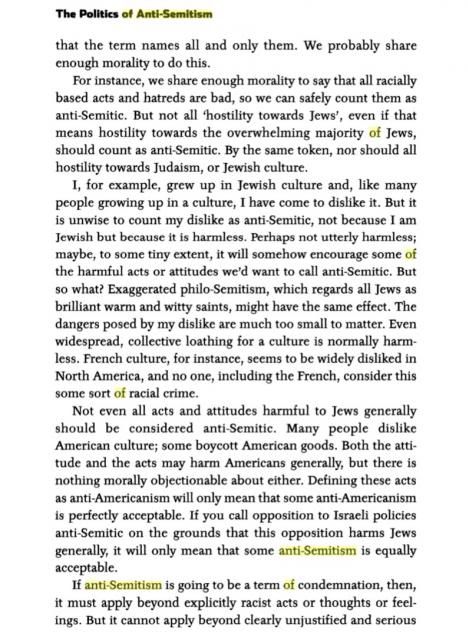
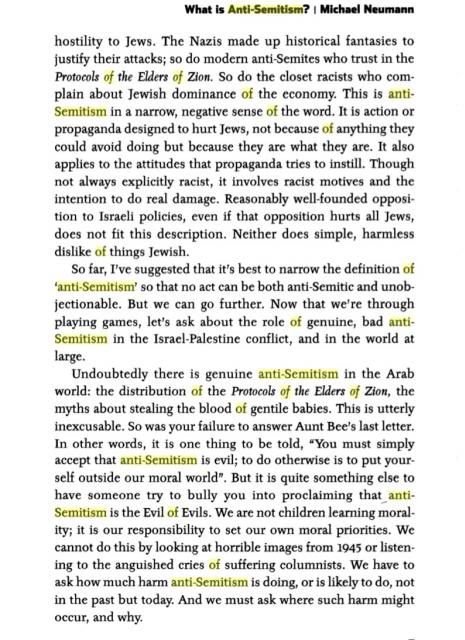
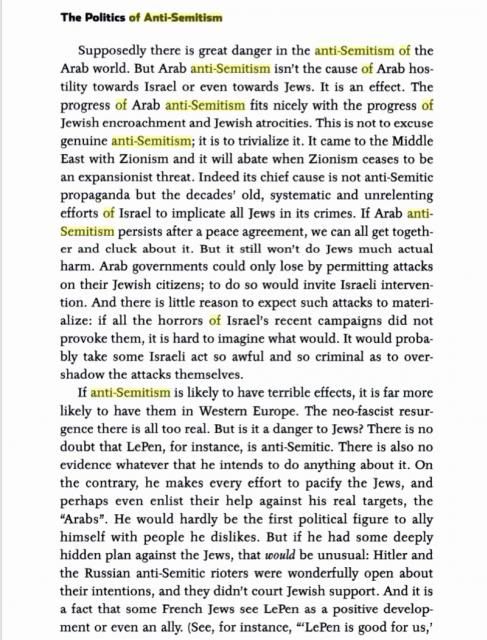
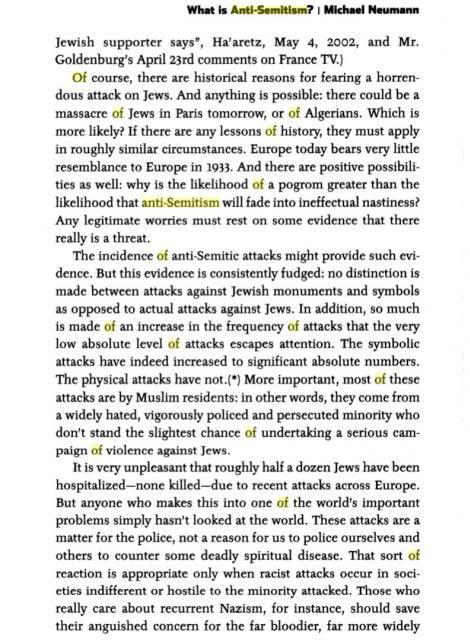
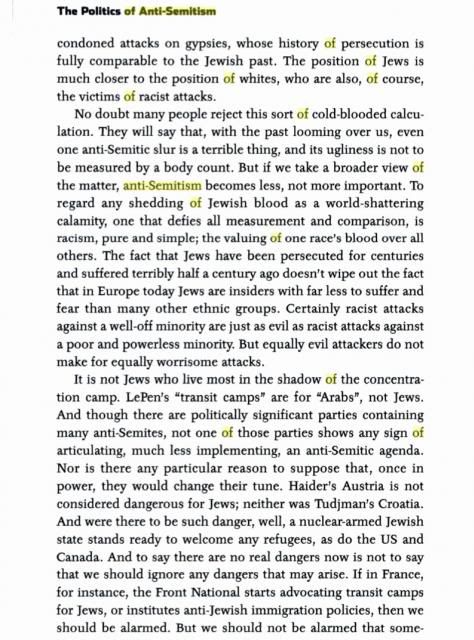
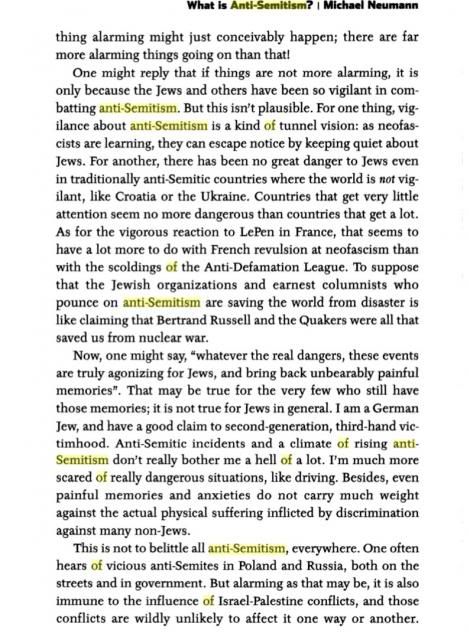
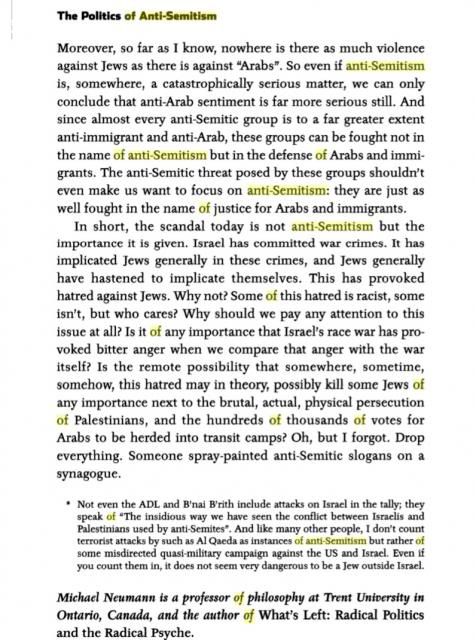
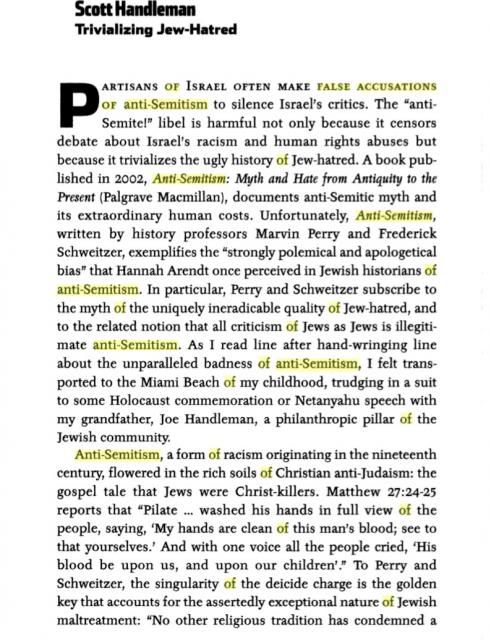
Moderators: Elvis, DrVolin, Jeff









solace » Wed Sep 04, 2013 5:44 pm wrote:American Dream » Wed Sep 04, 2013 6:18 pm wrote:A common critique of the book is that while it's real good at talking about uses of false charges of anti-Semitism as a political weapon, some of the authors are not good at acknowledging that real anti-Semitism does exist and is important.
Heres a couple of Neumann's quotes from that book:
"We should almost never take antisemitism seriously, and maybe we should have some fun with it. I think it is particularly unimportant to the Israel-Palestine conflict, except perhaps as a diversion from the real issues."
"Undoubtedly there is genuine antisemitism in the Arab world: the distribution of the Protocols of the Elders of Zion, the myths about stealing the blood of gentile babies. This is utterly inexcusable. So was your failure to answer Aunt Bee's last letter.'
What a gem he is.
edited to add: Here's another real gem from Nuemann. No wonder he's considered a good source.
"If an effective strategy means that some truths about the Jews don't come to light, I don't care. If an effective strategy [of helping the Palestinians] means encouraging reasonable anti-Semitism, or reasonable hostility to Jews, I also don't care. If it means encouraging vicious, racist anti-Semitism, or the destruction of the state of Israel, I still don't care."
http://www.jewishtoronto.com/page.aspx?id=45452

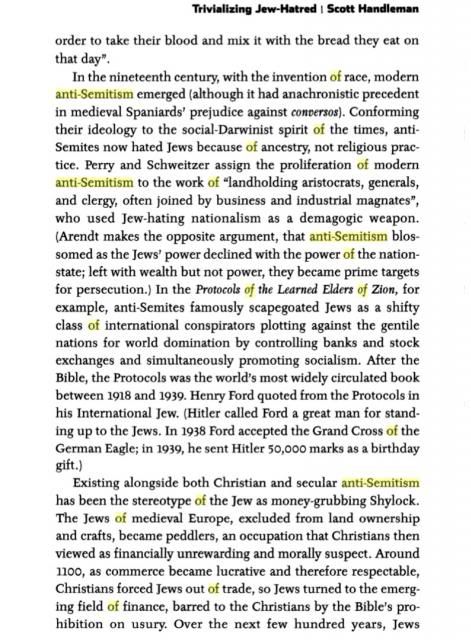
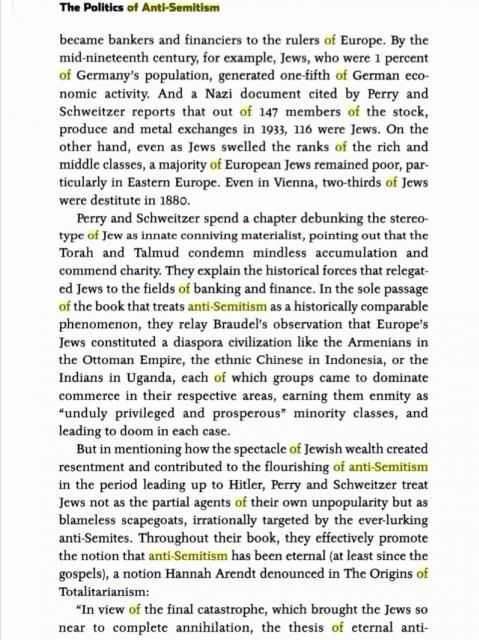
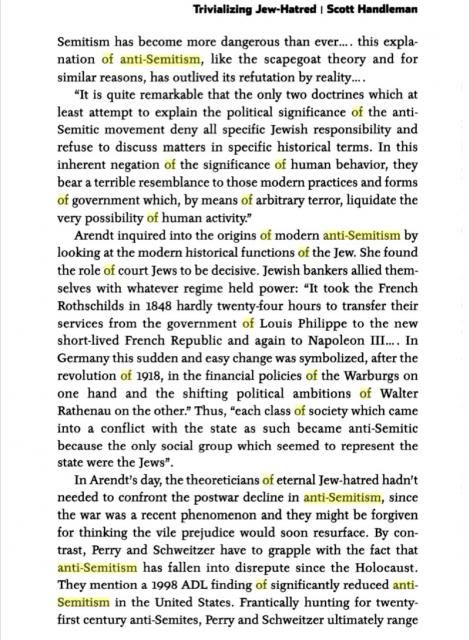
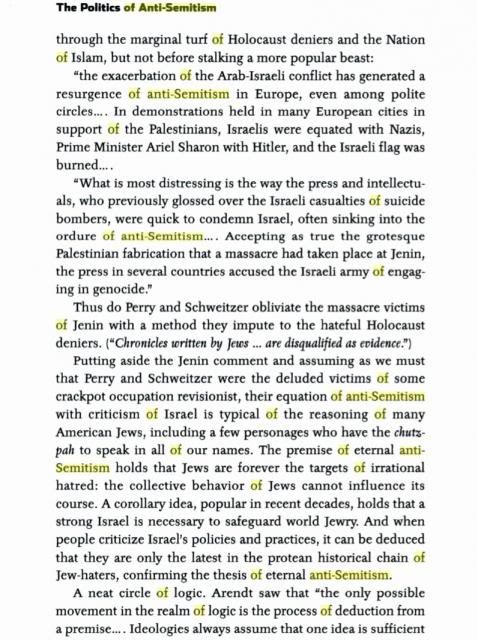
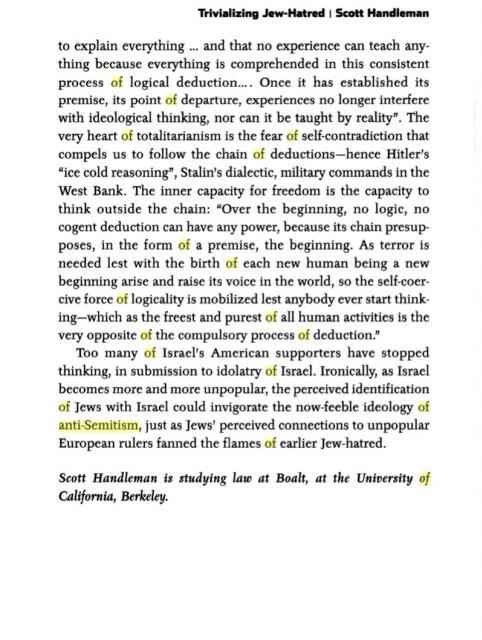
American Dream » Wed Sep 04, 2013 7:41 pm wrote:solace » Wed Sep 04, 2013 5:44 pm wrote:American Dream » Wed Sep 04, 2013 6:18 pm wrote:A common critique of the book is that while it's real good at talking about uses of false charges of anti-Semitism as a political weapon, some of the authors are not good at acknowledging that real anti-Semitism does exist and is important.
Heres a couple of Neumann's quotes from that book:
"We should almost never take antisemitism seriously, and maybe we should have some fun with it. I think it is particularly unimportant to the Israel-Palestine conflict, except perhaps as a diversion from the real issues."
"Undoubtedly there is genuine antisemitism in the Arab world: the distribution of the Protocols of the Elders of Zion, the myths about stealing the blood of gentile babies. This is utterly inexcusable. So was your failure to answer Aunt Bee's last letter.'
What a gem he is.
edited to add: Here's another real gem from Nuemann. No wonder he's considered a good source.
"If an effective strategy means that some truths about the Jews don't come to light, I don't care. If an effective strategy [of helping the Palestinians] means encouraging reasonable anti-Semitism, or reasonable hostility to Jews, I also don't care. If it means encouraging vicious, racist anti-Semitism, or the destruction of the state of Israel, I still don't care."
http://www.jewishtoronto.com/page.aspx?id=45452
That is seriously bad stuff.
American Dream » Wed Sep 04, 2013 10:40 pm wrote:Searcher08 » Wed Sep 04, 2013 5:36 pm wrote:American Dream » Wed Sep 04, 2013 4:56 pm wrote:So are there objective standards which put Atzmon and Icke on the good side and yet relegate Shamir, Carto, Hoffman and Springmeier to the bad end of things?
Because if so, I think we'd all benefit from hearing about those principles...
Look at the language - you are saying
I put Atzmon and Icke on the good side and
'relegate' the Stormfronter to the bad end of things.
This is putting *your* value judgement onto my distinctions.
I assert I am doing nothing of the sort - i am creating more distinctions than 'good' or 'bad' and saying just try looking at those as structures for how this conflict exists.
Surely making an appeal to 'objective standards' implies the same measurable criteria as software bug per thousand line of code or rejects per batches of cloth. To me, this is mistaking descriptions for physical realities - a systemic description (like these five classes) is still just my perception, my model, a way of thinking - I put it forward as a means of understanding the conflict there is here.
Let me be really clear - the work in showing up the Stormfronters is not something I minimise. I very carefully used the work 'Class' , rather than 'Level' as I do NOT consider the model hierarchical. I have mates in Greece, know about the shits of the Golden Dawn, I am aware that my model is NOT generalised across time and place.
Certainly I am also aware for example of people like Zundel deliberately using paraculture as a cover for race hate (admitting to writing books about UBoats under the antartic ice as a recuiting tool).
The purpose of a system is what it does, so when I look at the 'Icke system' or the 'Atzmon system' I look at what it does, because large numbers of people are involved around them. I see them as 'large scale information providers'
You put them and Ron Paul and Alex Jones and the Zeitgeist movement (and now Thrive??) in the Class 5 Anti-semites bubble, I dont.
I regard Phil Weiss as a pretty good guy - so seeing that there are similar intense multi-faceted debates across a wide range of people from USA, EU, Israel around Atzmon to me is worthwhile. I regard Icke and Jones as populists that often seem to have the effect of educating / sharing / communicating important information that others then run with - eg Icke re Savile; Jones re Aaron Russo
I would also include in this people like Joe Rogan, who bring information about entheogens out to so many people. Icke has had multiple experiences of ayahuasca and his descriptions of them and their impact was very similar to Graham Hancocks, full of respect and humility - and these experiences are absolutely informing what they are doing as a life path.
I'd still like to hear some objective criteria for differentiating Icke and Atzmon from the others because they seem to share a lot of similarly fucked-up ideas to me...
At this point, the only Jewish joke from Northern Ireland.
"The Rabbi wa on his way to Belfast's only synagogue when he was suddenly surrounded by a thug.
"Are ye Protestant, or are ye Catholic?" howled the thug
After a pause... the Rabbi said "I'm Jewish"
For a full minute, the black and white thinking of the thug struggled with this before he asked hesitatingly "Uhhh.. are ye a Protestant Jew, or a Catholic Jew?...
solace » Wed Sep 04, 2013 6:48 pm wrote:
But slad loves it so much she posted some of it AGAIN, above. What does that tell you? You know this shit is getting too much for me. I'm going back into lurker mode. Good luck with these lovers of this kind of shit.

Searcher08 » Wed Sep 04, 2013 7:07 pm wrote:American Dream » Wed Sep 04, 2013 10:40 pm wrote:Searcher08 » Wed Sep 04, 2013 5:36 pm wrote:American Dream » Wed Sep 04, 2013 4:56 pm wrote:So are there objective standards which put Atzmon and Icke on the good side and yet relegate Shamir, Carto, Hoffman and Springmeier to the bad end of things?
Because if so, I think we'd all benefit from hearing about those principles...
Look at the language - you are saying
I put Atzmon and Icke on the good side and
'relegate' the Stormfronter to the bad end of things.
This is putting *your* value judgement onto my distinctions.
I assert I am doing nothing of the sort - i am creating more distinctions than 'good' or 'bad' and saying just try looking at those as structures for how this conflict exists.
Surely making an appeal to 'objective standards' implies the same measurable criteria as software bug per thousand line of code or rejects per batches of cloth. To me, this is mistaking descriptions for physical realities - a systemic description (like these five classes) is still just my perception, my model, a way of thinking - I put it forward as a means of understanding the conflict there is here.
Let me be really clear - the work in showing up the Stormfronters is not something I minimise. I very carefully used the work 'Class' , rather than 'Level' as I do NOT consider the model hierarchical. I have mates in Greece, know about the shits of the Golden Dawn, I am aware that my model is NOT generalised across time and place.
Certainly I am also aware for example of people like Zundel deliberately using paraculture as a cover for race hate (admitting to writing books about UBoats under the antartic ice as a recuiting tool).
The purpose of a system is what it does, so when I look at the 'Icke system' or the 'Atzmon system' I look at what it does, because large numbers of people are involved around them. I see them as 'large scale information providers'
You put them and Ron Paul and Alex Jones and the Zeitgeist movement (and now Thrive??) in the Class 5 Anti-semites bubble, I dont.
I regard Phil Weiss as a pretty good guy - so seeing that there are similar intense multi-faceted debates across a wide range of people from USA, EU, Israel around Atzmon to me is worthwhile. I regard Icke and Jones as populists that often seem to have the effect of educating / sharing / communicating important information that others then run with - eg Icke re Savile; Jones re Aaron Russo
I would also include in this people like Joe Rogan, who bring information about entheogens out to so many people. Icke has had multiple experiences of ayahuasca and his descriptions of them and their impact was very similar to Graham Hancocks, full of respect and humility - and these experiences are absolutely informing what they are doing as a life path.
I'd still like to hear some objective criteria for differentiating Icke and Atzmon from the others because they seem to share a lot of similarly fucked-up ideas to me...
Objective to whom? and by what standard? You seem to be operating from a 'checklist' and ICke and Atzmon tick your 'Class 5: AntiSemitic shits' boxes
I am not doing an 'hard edged' ANALYSIS, I'm doing a System Map, because I consider it an ecosystem, not a machine.
I gave you detailed information on how I differentiate them and after all that you just say
"But they are Class 5: Antisemitic shits"At this point, the only Jewish joke from Northern Ireland.
"The Rabbi wa on his way to Belfast's only synagogue when he was suddenly surrounded by a thug.
"Are ye Protestant, or are ye Catholic?" howled the thug
After a pause... the Rabbi said "I'm Jewish"
For a full minute, the black and white thinking of the thug struggled with this before he asked hesitatingly "Uhhh.. are ye a Protestant Jew, or a Catholic Jew?...
The Politics Of Anti-Semitism
Part I: Smear, Slander, And Intimidation
by Gilles d'Aymery
Book Review
April 26, 2004
There is no topic on the part of this writer that triggers as much trepidation as that of anti-Semitism -- that is, as it is commonly meant but etymologically incorrect, Jewish hatred -- in the context of the US-Israeli symbiosis with its potential influence on US domestic and foreign policies and its staggering consequences for the Palestinians. To broach it or be brought into it invites passionate reactions, raw controversies, emotional debates, and scorching denunciations. Whatever approach is taken to address the matter makes no difference. One always ends up on the defensive, having to stave off one accusation or the other. So, Alexander Cockburn and Jeffrey St. Clair should be commended for daring to publish and edit The Politics of Anti-Semitism, an excellent collection of 18 essays on this explosive subject. While this writer willingly acknowledges his uneasiness in reviewing this anthology knowing the onslaught of criticism to come, hopefully some good will result and readers will buy this worthy book and carefully examine its content.
Cockburn and St. Clair assembled a series of, for the most part, brilliant and incisive essays superbly written by a variety of thoughtful authors whose views and analyses would much deserve the broader dissemination The New York Times and the main media could offer...if we lived in a perfect world. Wide spread anti-Semitism and anti-Semitism baiting are properly debunked; the Israeli repressive policies against the Palestinians lucidly tackled, showing that contrary to the line propagated by Officialdom Jewish Americans are far from forming a monolithic, pro-Israel block; and, the case is made, albeit less convincingly, on the influence of Israel and US Jewish organizations on official Washington (which will be explored in Part II of this review).
To begin with, let's jump over a couple of hurdles: first, a factual clarification and then a bit of semantics and context.
In their short introduction, Cockburn and St. Clair state: "The bottom line is Israel's denial of Palestinians' right to a nation, living within secure borders, just like Israeli Jews." Let's fess up to it, Israel has never denied the right of Palestinians to a state (not a nation), within secure borders, at least from the day Palestinians have been recognized as a people (a nation). It's the geographical location of the Palestinian state that causes the quandary. Israel would be more than glad to facilitate the creation of a Palestinian state, say in Jordan (simply rename the country), or, as Cockburn writes in his muckraking essay, "My Life as an 'Anti-Semite'," "Dearborn or the space in Dallas-Fort Worth airport between the third and fourth runways (the bold Armey plan)," -- and, of course, wherever the Palestinians' Arab brethrens would accommodate them. Even Benny Morris would agree! So, accuracy on some occasions is worth splitting a few hairs, for their introductory statement could easily be construed by ill-intentioned people or skeptical critics as yet another example of malicious conclusion.
The semantic question will undoubtedly bring down everybody's wrath but it need be asked and its context explained: What is a "Jew"? (As in, what is a "Christian" or a "Moslem"?) Growing up in France, in the 1950s and 1960s, the terms "Jew" or "Jews" -- c'est un juif (it's a Jew), les juifs (the Jews) -- had a thoroughly negative connotation. It was associated with the rabid anti-Semitism that percolated France in the 1920s and 1930s (even though France had had a Jewish Prime Minister during part of that horrid period) and led, among other causes, to the shameful collaboration of the Vichy regime (Pétain, Laval, et al.) with Nazi Germany. Keep in mind that the "Jews" had been relentlessly depicted as blood-sucking evils with crooked noses and big ear lobes, and accused of instigating the communist revolution, controlling the world's economy (more on this later in relation to the current status of Jewish Americans in US society, the "Jewish lobby," or "Israel lobby," as treated in Cockburn/St. Clair's valuable anthology), profiteering from wars, enriching themselves on the backs of the workers, etc. The "Jews," in short, were up to dominating the world. While it may be history to the many, those of us whose fathers had known the camps of death were, to say the least, impressed. Here are four examples to refresh memories:
See note (1) for attributions.
With a flurry of discoveries and publications regarding the extent of the WWII genocidal carnage, efforts were made, whether consciously and out of shame/guilt or subconsciously and still out of shame/guilt, to once and (hopefully) for all eliminate the stigma. People were French first, a full member of the secular republic and one's religion was relegated to a secondary status: A French who happened to be Catholic, or Jewish, or Protestant... There was a distinct effort to remove any shade of racial, and maybe even cultural, differences and to look at Judaism in mostly religious terms -- all the while, in the wake of the Algerian march toward independence, racism was being diverted toward Arabs. Yet, traditional values were still potent. As well as divorce was shunned intermarriages were few. As an older friend who could have become this writer's stepmother recently explained, it could not happen then because "I was Jewish and he [this writer's father] was Catholic." One way or the other these growing experiences led to a mental construct, a frame of reference: For better or worse, people first -- a personal distaste to label people according to their religion or their race, a rather anachronistic or out-of-sync approach in our age of identity politics...
The fact remains that there are plenty of differences -- as well as commonalities -- between a Jewish French and a Jewish American, as there are between a Catholic French and a Catholic American (strange, isn't it, that we rarely hear the latter two expressions, even in our age of narcissist polarization), or for that matter and quite simply between a French and an American. The same can be said between a Sephardic and Ashkenazi Israeli, or between a reformed Jewish individual and an ultra-orthodox one, etc. Religious fundamentalists have much to share as humanists do, be they from Jewish or Christian or Moslem background. And this can be extended to all religions and races... "Birds of a feather flock together..."
So, what is a "Jew"? To answer the perennial question about the famed "Jewish identity," let Michael Neumann, a professor of philosophy at Trent University in Ontario, Canada, speak to the issue. His essay, "What Is Anti-Semitism," by and of itself is worth forking over the $12.95 to get a copy of The Politics of Anti-Semitism. Not only is Neumann witty, he is incisive and clear-minded; in a short 12 pages, he eloquently demonstrates how far our Western societies have moved away from the first half of the 20th century in regard to Jewish hatred and how much the current inflationary charges of anti-Semitism made in some quarters against any critics of Israel cheapen the very definition of Jewish hatred. He writes:
[W]e come up against the venerable shell-game of Jewish identity: "Look! We're a religion! No! a race! No! a cultural entity! Sorry -- a religion!" When we tire of this game, we get suckered into another: "Anti-Zionism is anti-Semitism!" quickly alternates with "Don't confuse Zionism with Judaism! How dare you, you anti-Semite!" (p.1)
Neumann could have added another identity to the shell game -- that of eternal victim; an identity that Norman Finkelstein, who also contributed to this anthology, has analyzed in other circumstances.
But, if this is the definition of a Jew -- religion, race, cultural entity, victimhood -- can't it be extended to other social groups? Without waxing rhetorical, aren't then all Americans "Jews?" Religion: Christian (with minorities); race: white (with minorities), culture: American (with variations); victim: "why do they hate/attack us?" It may be a slightly far-fetched analogy, possibly not entirely correct (though attach the notion of "chosenness" to the litany, and the similarities become striking), but the point here is that it's mentally more sensible and intellectually more honest to visualize Jewish people in all of their diversity rather than as a block, a group, a tribe, the "Jews." This mental approach has also the merit of allowing the observer or the analyst to look at the state of Israel, not as being the state of, or for the "Jews," whatever the Zionist construct would wish it to be, and to disassociate oneself from the invalid equation: Israeli policies against Palestinians equal Jewish policies against Palestinians.
Notwithstanding that in the Middle East Jews and Zionist Israel are synonyms, completely interchangeable, and that Jewish-hatred is rampant (as Lenni Brenner concludes in his contribution to the anthology, "Bluntly put: if you want to end today's "anti-Semitism" against Jews, end Zionism's "anti-Semitism" against Palestinians."), it is nevertheless factually incorrect to interchange Jews and Israelis. There are many more Jewish people outside the state of Israel than inside. And, whatever their emotional attachment to Israel, many aren't turning a blind eye or condoning Israel's atrocious policies against the Palestinians. Here is what Bruce Jackson, SUNY Distinguished Professor and Samuel P. Capen Professor of American Culture at the University of Buffalo, in his contribution, "Jews Like Us," has to say on this topic:
They are spreading poison about American Jews. Many of the people spreading this poison are Jews themselves, a relatively small group that wants to convince everybody (or at least everybody in power) that the great bulk of us think as they do, which we don't. Some non-Jews, like Pat Buchanan and other less-rabid but no less invidious bigots, also find a good way to stereotype us: Jews all think alike, dontcha know. It's weird and freaky when militant right-wing Jews can hook up with old-fashioned anti-Semites to stereotype the rest of us, but these are weird and freaky times. (p. 53)
[...]
All reliable studies and surveys show that the great majority of American Jews, whatever the level of their support for Israel itself, oppose unilateralism, favor a Palestinian state, are opposed to the settlements in the Occupied Territories, oppose Sharon's militancy, are sickened and appalled by the images of Israeli tanks destroying homes, villages and vineyards, and are desperate for the killing and dying on both sides to stop now. Not after every potentially suicidal Palestinian is wiped out. Not after the world is made perfect. Now. (p. 55)
Indeed, the variety, the diversity of Jewish people is astonishing. Not long ago, this reviewer asked three regular Swans' contributors for their sentiment on whether Israeli policies against the Palestinians were genocidal. Their advice was sought quite specifically because all three are Jewish, of three different generations (ages between 20-, 50- and 70-something). Answers came forth. One did not know "what the heck the Israelis were engaged in" (genocide, ethnic cleansing?) and didn't find himself "flying to their defense." "Indeed" he added, "some harsh words from this end would help wake them up to their sickness." But he felt that genocide was not the proper characterization of Israeli policies. The second one "didn't think that the term genocidal was accurate." He considered that "apartheid Israel was better." The last one answered that according to the definition of genocide in the Geneva Convention, "intent is an important element and a partial action of any of the enumerated items would satisfy the definition." Hence, yes, "it is genocide." Three Jewish Americans, three different answers (which did not help this hapless editor!) -- and three individuals that would immediately be branded with the label, "Jewish self-hater" or "self-hating Jews" like all the Jewish contributors to The Politics of Anti-Semitism, from Yigal Bronner to Yuri Avneri, Scott Handleman, Michael Neumann, Bruce Jackson, et al., who are used to the appellation, and the non-Jewish contributors who are regularly assailed with the "anti-Semite" smear. Like so many things in life, one tends to become immune after a while...
Decades ago, in the wake of the Holocaust, there were ample reasons -- not all pure and disinterested -- for the world, in its majority, to feel an emotional attachment and support for the state of Israel and the plight of the Jewish people. It was the age of Exodus and of "a land without a people for a people without a land." Forging ahead over the years some unpleasant realities seeped to the surface. The land, actually, had been inhabited by a people. Its national identity was denied at first -- they were labeled "Arabs," in a tribal and racist fashion, the same way racists refer to "Jews" as some kind of monolithic block. Then, it became known as the Palestinian people and the world slowly found out that this people had in part been dispossessed, dispersed, expulsed, to make room for the newcomers. The rest is history; a history of colonialism and resistance, abject racism, where the oppressed of yesteryear became the oppressors held hostage by fundamentalists, secular or otherwise, in an increasing cycle of violence, of blood and tears, further dispossessions, time and again, and, who knows, when the time is deemed existentialistically "right," to the "final disposition" of the Palestinian problem; that is, the forced expulsion of all Palestinians from the Occupied Territories (cf. Benny Morris, et al.). (2)
No one then should be surprised by the change of hearts and minds over the world, from people of all religious persuasions and cultural backgrounds -- people who, in the words of Bruce Jackson, "speak softly or rationally."
And no one should be surprised either that, put on the defensive, in spite of an overwhelming financial and military superiority, the advocates of Greater Israel have to resort to sophistry, circular logic, fear-mongering and slander. Anyone who dares speak out faces an immediate campaign of calumny to discredit and eventually silence him or her. M. Shahid Alam in his short essay, "A New Theology of Power," provides a sound example of this appalling strategy. So does Kurt Nimmo as he relates the travails Amiri Baraka, the Poet Laureate of New Jersey, had to endure for having written his 2002 poem, "Somebody Blew Up America." (3)
The irony is that Jewish hatred is, as noted in the anthology, at an historical low point, especially when compared to anti-Semitism against Moslems both in Europe and in the United States, which clearly feeds upon anti-Arab racism. Regrettably these communities cannot rely on the resources and the help of the powerful Anti-Defamation League, its sister organizations, the powers that be and their allied media, to document, condemn and fight the abuses to which they are increasingly subjected.
Give credit to the courage of these essayists who are raising their voices in ever larger numbers, speaking softly perhaps but rationally and honestly. They should be emulated by all of us and their words should be read and disseminated widely, for, with great ethical clarity, they are raising their voices in the name of justice and humanism, without resorting to the demeaning sloganeering and slandering of their opponents. Let us not be held captive by the critics and detractors who keep throwing at us what happened some 60 and more years ago.
There is much more in The Politics of Anti-Semitism that deserves attention. The influence of Israel and Jewish organizations on US policies will be reviewed in the forthcoming Part II. But, of particular note are the essay of Yigal Bronner, a member of Ta'ayush, the Arab-Jewish Partnership, and professor at Tel Aviv University, and one of the last essays of Edward Said, before he lost his life to cancer. Both of them offer a sane and humane vision in which Israelis and Palestinians are able to live together, side by side, with all their diversity and commonality, in peace. They conclude the collection fittingly, with hope for the future.
Notes and Resources
1. The four pictures come from Le Dossier Juif, published by SE SNRA, Paris, France, 1979.
a) "Juden Raus" ("Jews Out"): Dossier #3, "Allemagne, 1918-1945," p. 38.
b) "The Eternal Jew:" Dossier #3, "Allemagne, 1918-1945," p. 49.
c) 1937 French Postcard: Dossier #1, "France, 1940-1945," p. 16. The post card reads:
"Who won the war of 1914? [Ed. WWI]
Who will win the next one?
The Jews!
If France is defeated, we will reign in Paris,
If Germany is defeated, we will reign in Berlin.
d) 1937 Propaganda stamp: Dossier #3, "Allemagne, 1918-1945," p. 38. The stamp reads:
"Without the extinction of the Jewish race, there is no salvation for humanity"
Source: Author's personal library. Published under the provision of U.S. Code, Title 17, section 107. (back)
2. See: Ari Shavit, "Survival of the fittest," Ha'aretz, January 5, 2004, (interview with historian Benny Morris) - http://www.haaretz.com/hasen/spages/380986.html (as of 1/10/2004) and http://www.haaretzdaily.com/hasen/pages ... mNo=380986 (as of April 8, 04 -- only part of the interview is displayed).
See also: Gilles d'Aymery, "Hearts, Minds, And The Military in Iraq," Swans, April 12, 2004. (back)
3. Amiri Baraka, "Somebody Blew Up America," September 2002 - http://www.amiribaraka.com/blew.html (as of 1/18/2004). (back)
Zionism's Bad Conscience, By Joel Kovel, Tikkun Sept/Oct 2002. (as of 4/18/2004)
Zionism in the Age of the Dictators: A Reappraisal, by Lenni Brenner, 1983 (as of 4/18/2004)
51 Documents: Zionist Collaboration with the Nazis, by Lenni Brenner, CounterPunch, December 23, 2002. (as of 1/18/2004)
Swans (magazine)
From Wikipedia, the free encyclopedia
Swans Commentary
Editor Jan Baughman, Gilles d'Aymery
Frequency bi-weekly
Publisher Gilles d'Aymery
First issue May 1996
Country United States
Language multilingual
Website www.swans.com
ISSN 1554-4915
Swans Commentary is an American online political and literary magazine, created in 1996; co-editors are Jan Baughman and the French essayist and political commentator Gilles d’Aymery,[1] who is the magazine's publisher.
Contents [hide]
1 Collaborators and contributors
2 Themes
3 References
4 External links
Collaborators and contributors[edit source | editbeta]
Swans publishes significant authors (like the critic Charles Marowitz,[2] also collaborator of Peter Brook), and regular or occasional relevant contributors:[3] Paul Buhle, Art Shay,[4] Louis Proyect,[5] Alison Phipps (University of Glasgow),[6] the multilingual poet Guido Monte, the novelist Alma A. Hromic (aka, Alma Alexander), Michael Barker,[7] Mohammed Ben Jelloun,[8] Edmund Berger, the economist Edward S. Herman[9] (and the experts of political economy Shimshon Bichler and Jonathan Nitzan, the philosopher Michael Neumann, Naseer Aruri, R. J. Berry, Denis Halliday, Michael Parenti, Anthony Arnove, Isidor Saslav).[10]
Themes[edit source | editbeta]
A magazine about non-violent and pacifist[11] political themes, with a progressive editorial line, Swans condemns the commercialization of the Web and is “…about thinking, questioning, observing, and providing ideas that are lacking in the mainstream media.”[12] The interest about political principles,[13] joins in world geo-political articles, especially about the Balkans,[14] Iraq[15] (with special and meaningful works)[16] and Palestine.[17]
Swans publishes also a few articles in French on a monthly basis, Le coin français, which are edited by the French story teller and translator Marie Rennard;[18] Jean-Claude Seine contributes his words and pictures.
c o m m e n t a r y
(Since 1996)
August 26, 2013
Trade liberty for safety or money and you'll end up with neither. Liberty, like a grain of salt, easily dissolves.
The power of questioning -- not simply believing -- has no friends. Yet liberty depends on it. ***
W H Y N O T S U P P O R T I N G S W A N S ?
Note from the Editors: This weekend's commemoration of the Civil Rights march on Washington, D.C., and the remarkable speech by Dr. Martin Luther King may boast a different demographic, showing how far we've evolved, but the cry for jobs and freedom has not been satisfactorily answered in the past fifty years. At the same time, across the Middle East Syrians and Egyptians too are marching, though it's not exactly in the name of "democracy," as characterized by the Establishment leaders and their media. It's much more basic than that -- food, water, fuel, and jobs as well -- as Gilles d'Aymery explains, along with some thoughts on Chelsea (Bradley) Manning, and more. The Establishment's plethora of resources seems to blind them to the realities of the vast majority, no matter the country. Except, that is, in Scandinavia. Joel Hirschhorn took a trip to see with his own eyes why Denmark, Norway, Sweden, and Finland rank at the top of every economic and social index. Answer: they actually care about their citizens' well being. In contrast, Glenn Reed tells the story of a man called Fuzzy, who fell on hard times and joined the group of castaways our society is so adept at dumping. Meanwhile, with all the tough talk about our military options in Syria, it's worth reading Randolph Bourne's unfinished 1918 essay, "War is the Health of the State." And as for health and the state, Linus Pauling meets John Birch in Michael Barker's article on vitamin crusaders.
It's time for some much-needed dialogue, and in that of Peter Byrne, conversations cross paths at the breakfast table from her dream to his indifference. Raju Peddada's random conversation explores men's insecurity and religious views on women and sexuality, and in contrast, John Marshall's poem brings two souls together beautifully in eternal, ethereal light. More poetry from David Francis in a cloudland of the segregated south, and Guido Monte's fragments of conversation from his mind and from the street. We close with your letter regarding Manuel García on Frank Rich and Edward Snowden, and Jan Baughman's reaction to Joel Hirschhorn's illuminating article on Scandinavia.
solace » Wed Sep 04, 2013 5:44 pm wrote:American Dream » Wed Sep 04, 2013 6:18 pm wrote:A common critique of the book is that while it's real good at talking about uses of false charges of anti-Semitism as a political weapon, some of the authors are not good at acknowledging that real anti-Semitism does exist and is important.
Heres a couple of Neumann's quotes from that book:
"We should almost never take antisemitism seriously, and maybe we should have some fun with it. I think it is particularly unimportant to the Israel-Palestine conflict, except perhaps as a diversion from the real issues."
"Undoubtedly there is genuine antisemitism in the Arab world: the distribution of the Protocols of the Elders of Zion, the myths about stealing the blood of gentile babies. This is utterly inexcusable. So was your failure to answer Aunt Bee's last letter.'
What a gem he is.
edited to add: Here's another real gem from Nuemann. No wonder he's considered a good source.
"If an effective strategy means that some truths about the Jews don't come to light, I don't care. If an effective strategy [of helping the Palestinians] means encouraging reasonable anti-Semitism, or reasonable hostility to Jews, I also don't care. If it means encouraging vicious, racist anti-Semitism, or the destruction of the state of Israel, I still don't care."
http://www.jewishtoronto.com/page.aspx?id=45452
Indeed, the variety, the diversity of Jewish people is astonishing. Not long ago, this reviewer asked three regular Swans' contributors for their sentiment on whether Israeli policies against the Palestinians were genocidal. Their advice was sought quite specifically because all three are Jewish, of three different generations (ages between 20-, 50- and 70-something). Answers came forth. One did not know "what the heck the Israelis were engaged in" (genocide, ethnic cleansing?) and didn't find himself "flying to their defense." "Indeed" he added, "some harsh words from this end would help wake them up to their sickness." But he felt that genocide was not the proper characterization of Israeli policies. The second one "didn't think that the term genocidal was accurate." He considered that "apartheid Israel was better." The last one answered that according to the definition of genocide in the Geneva Convention, "intent is an important element and a partial action of any of the enumerated items would satisfy the definition." Hence, yes, "it is genocide." Three Jewish Americans, three different answers (which did not help this hapless editor!) -- and three individuals that would immediately be branded with the label, "Jewish self-hater" or "self-hating Jews"
like all the Jewish contributors to The Politics of Anti-Semitism, from Yigal Bronner to Yuri Avneri, Scott Handleman, Michael Neumann, Bruce Jackson, et al., who are used to the appellation,
and the non-Jewish contributors who are regularly assailed with the "anti-Semite" smear. Like so many things in life, one tends to become immune after a while...
So, what is a "Jew"? To answer the perennial question about the famed "Jewish identity," let Michael Neumann, a professor of philosophy at Trent University in Ontario, Canada, speak to the issue. His essay, "What Is Anti-Semitism," by and of itself is worth forking over the $12.95 to get a copy of The Politics of Anti-Semitism. Not only is Neumann witty, he is incisive and clear-minded; in a short 12 pages, he eloquently demonstrates how far our Western societies have moved away from the first half of the 20th century in regard to Jewish hatred and how much the current inflationary charges of anti-Semitism made in some quarters against any critics of Israel cheapen the very definition of Jewish hatred. He writes:
[W]e come up against the venerable shell-game of Jewish identity: "Look! We're a religion! No! a race! No! a cultural entity! Sorry -- a religion!" When we tire of this game, we get suckered into another: "Anti-Zionism is anti-Semitism!" quickly alternates with "Don't confuse Zionism with Judaism! How dare you, you anti-Semite!" (p.1)
Neumann could have added another identity to the shell game -- that of eternal victim; an identity that Norman Finkelstein, who also contributed to this anthology, has analyzed in other circumstances.
http://www.swans.com/library/art10/ga176.html

Hassan Rouhani @HassanRouhani
As the sun is about to set here in #Tehran I wish all Jews, especially Iranian Jews, a blessed Rosh Hashanah. pic.twitter.com/tmaf84x7UR
Hassan Rouhani @HassanRouhani
Our goal is to bring back a smile to your faces; my main responsibility is to protect this #love, #trust and #hope. pic.twitter.com/CTYqVPVc6y
The Politics Of Anti-Semitism
Part II: Stereotypes And Other Canards
by Gilles d'Aymery
Book Review
May 10, 2004
In the wake of the second conference on anti-Semitism, held in Berlin on April 28/29, 2004 by the Organization for Security and Co-operation in Europe, Abraham Foxman, the director of the always vigilant Anti-Defamation League (ADL), declared that, in light of a survey released by the ADL, anti-Semitism had decreased in most of Europe over the past two years. "The good news is that regardless of the methodology we use, there is a decrease in anti-Semitic attitudes in eight out of the 10 countries surveyed," Mr. Foxman said. "The bad news is it seems to be open season on Israel and the level of criticism is almost beyond reason." (1) But, the Secretary General of the World Jewish Congress, Israel Singer, said in an interview with the German ZDF TV: "Anybody in a democracy can raise criticism -- this is not anti-Semitism." (2) For his part, speaking on behalf of the European Union, Irish Foreign Minister Brian Cowen cautioned, "We cannot and should not expect reasonable criticism and fair comment about specific Israeli government policies to fall silent." (3) And US Secretary of State Colin Powell told the conference that "[I]t is not anti-Semitic to criticize the policies of the state of Israel." (4)
Of course, "reasonable criticism and fair comment" can be debated at length, but the zest of these "official" comments validate -- and vindicate -- the essayists reviewed in Part I of The Politics of Anti-Semitism, the worthy collection edited by Alexander Cockburn and Jeffrey St. Clair. For most folks, to criticize Israel is neither an expression of anti-Israelism, anti-Semitism, or anti-whatever. It's about being aghast by the violent policies of the respective governments of the state of Israel, since its very inception in 1948, against the Palestinians. Anyone who has spent time in the post-1967 Occupied Territories (as this writer did) would concur. Racism, blatant, ugly discrimination, prejudice, injustice, intolerance, violence, destruction, land and resources grabs -- you name it -- will testify to these policies. It has little to do with Judaism per se. It has all to do with people. More and more Jews, Christians, Muslims, Atheists, Buddhists, Pagans, Agnostics, etc. all over the world, are appalled by Israel's policies done under the cover of accusations of anti-Semitism galore, age-old pogroms, and, oh combien, the Holocaust -- anything to fulfill the "Covenant," as each and every Israeli prime minister has claimed, from David Ben Gurion to Ariel Sharon; that is Eretz Israel. (5)
Again, in the words of Israel Singer, "Anybody in a democracy can raise criticism -- this is not anti-Semitism." Singer or Powell should have added that Jewish criticism of the policies of the state of Israel does not denote self-hating Judaism either (how can one hate oneself, anyway?) -- the same way that it is not anti-American to oppose the policies of the US government, the Iraq invasion and occupation, and the like (is Senator Robert Byrd anti-American?). This is amply, clearly, and powerfully demonstrated in The Politics of Anti-Semitism.
Less convincing, however, are the essays covering the reasons behind the apparent symbiosis of US and Israeli policies, put forward by Alexander Cockburn, Jeffrey Blankfort (former editor of Middle East Labor Bulletin), George Suderland (a pen name for a senior congressional staffer), Kathleen and Bill Christison (both retired CIA officers and authors), and to a lesser degree, Jeffrey St. Clair in his excellent summary of Israel's attack on the USS Liberty in 1967. To summarize their views -- not an easy task, even after reading those essays repeatedly -- it looks like American politics is dominated by powerful Jewish interests, the Jewish Lobby or Israel Lobby (AIPAC), the media, Hollywood, rich Jews, and powerful ideologues with dual loyalties that control the executive and legislative branches of the US government. "Jewish money" buys elections; US representatives and senators are "quislings" (p. 126); that is, expressing a "sheer groveling subservience to a foreign power" (p. 119), in Suderland's words. Congress is "Israeli-occupied territory" (p. 128). And on it goes till the reader is left with the distinct impression that, by golly, the nefarious "Jews" are at it again, or at least some of them, in the media, in commerce and industry, in entertainment, and in the corridors of power. Jeez, are those "Jews" powerful or what? It is the kind of rhetoric one would expect to find on Antiwar.com, or Rense.com, or originating with the Buchanan brigades. That's disturbing and from this writer's opinion, reprehensible, or at the least, and to give the benefit of the doubt to these authors, ill-considered rhetoric.
Typical perception situation: One of the most difficult, if not impossible, tasks in the realm of political or social sciences, which are anything but scientific, is to logically demonstrate a point. French author Alphonse Allais once said that "logic gets you everywhere so long as you get out of it;" and to paraphrase Eugène Ionesco, if you take a circle and caress it, it'll become a vicious...circle... Begin with a reality -- Israel and the USA are close allies; carry on with a question -- Are the interests of Israel and those of the USA congruent? Answer the question in the negative (or the positive, or anywhere in between). Follow with another one -- Why the apparent symbiosis? And end with -- who controls whom? You now have a set of premises and can begin to build your case with much rationalization (the legendary "but it's the Truth").
Due to the magnitude of, and the raw emotions surrounding the issue, arguments and counter-arguments will quickly degenerate into personal attacks, an endearing genre of the adversarial nature of the American psyche. So it goes... It can be quite entertaining for a short while.
The main media are controlled by the "Jews."
Of course not, assures Cockburn:
Obviously, Jews don't "control" the media. All the same, Jewish families are proprietors of some of the most powerful newspapers in the country. Is it likely that this has no bearing on their coverage of the Middle East? So, it's reasonable to point out that Jewish families control the New York Times and the Washington Post and to put up for discussion whether this affects the editorial stance of both newspapers. But it's also true that the most rabid of all papers in its Israel-right-or-wrong stance is the Wall Street Journal, which is not Jewish owned and whose most influential editor was Robert Bartley, a mid-western Christian. (p. 33)
What to make of this statement? The WSJ is not Jewish owned but is rabidly pro-Israel. The NYT and the WP, on the other hand, are Jewish owned and pro-Israel (rabidly?). Why then put up for discussion the editorial stance of the latter but not that of the former? Because the latter is Jewish owned (though publicly traded)? Then, what about the Murdoch media empire? Should not the Fox News editorial stance be put up for discussion too? And what about the editorial stance of The Weekly Standard, a neo-con magazine fully owned by the same Murdoch at substantial costs (the magazine is a money pits)? Don't they all have a pro-Israel editorial stance?
Could it be then that the main media reflects and disseminates the policies and the ideology of the USA and its elites, whatever the ownership may be?
Now, one can always single out Jewish-owned media, even out of good intention or curiosity: do a Google search on 'media control, jews'. Is this the company one wants to keep?
"Jews" and the Israel Lobby buy elections.
One can find plenty of food for this allegation, from Paul Findley to Adlai Stevenson, and more recently from George W.H. Bush (Bush 41) to Earl Hilliard and Cynthia McKinney. That AIPAC, the fearsome American Israel Public Affairs Committee (with its 65,000 members), and "Jewish money," can make or break a political career is a perennial charge, argued with passion, by people of all ideological backgrounds, left and right.
According to Alexander Cockburn and Jeffrey Blankfort, Cynthia McKinney's re-election bid was thwarted by the power of the Jewish lobby as she lost the Georgian primaries to a lesser-known candidate. Undoubtedly, AIPAC, a pro-Israel "bi-partisan" organization attending both democrats and republicans, went after McKinney once she had made what was considered anti-Israel remarks. But, so did republicans. As Joel Beinin, a contributing editor of Middle East Report and a professor of Middle East history at Stanford University, explained in a must-read article (6), "McKinney was defeated in part because the open primary allowed Republicans angered over her comments about the September 11 attacks to cross over and vote against her in the Democratic primary." Adds Beinin, "Nonetheless, [Hilliard and McKinney] defeat enhanced the impression that the pro-Israel lobby wields great power in electoral politics."
Jeffrey Blankfort makes the case that Bush 41 lost his re-election in 1992 because of AIPAC's response to his decision to forego loan guarantees to Israel so long as the Israeli government did not freeze the settlements in the Occupied Territories.
Says Blankfort:
... Jewish lobbyists descended on Washington in such numbers that Bush felt obliged to call a televised press conference in which he complained that "1,000 Jewish lobbyists are on Capitol Hill against little old me." It would prove to be its epitaph.
... It was all downhill from there. Bush's Jewish vote, which had been estimated at 38% in 1988, dropped down to no more than 12%, with some estimates as low as 8%.
Why did Mr. Bush feel obliged to call a press conference and make this remark if the lobby was so powerful? Never mind... So, AIPAC and the Jewish voters were one possible cause of Mr. Bush's demise, but was it the primary one? What about the economy ("it's the economy, stupid")? When is the last time a US president has been re-elected in the midst of a recession? Any idea? Did the "Jewish vote," which would presume a monolithic voting block, abandon Mr. Bush only because of his perceived anti-Israel policies? And what about the Ross Perot phenomenon? Was it not a significant factor in Mr. Bush's defeat at the polls? Only AIPAC, the Israeli government and the "Jewish money" defeated Bush 41? Hello?
This is not to underestimate the relative power of the Jewish lobby. AIPAC has a series of testimonials on its Web site, which indicate the strength of its relations with elected officials and policy makers. But its influence should not be overestimated either. There are other influential lobbies in the U.S. (oil and chemical industry, pharmaceutical industry, trial lawyers, financial institutions, etc.). For all, the nature of the relationship is closely subordinated to the interests of the decision makers who represent and are part of the ruling class. Lobbyists, Jewish or not, do not rule. Still, those who want to believe in the might of Israel and the Israel lobby can always find solace in Ariel Sharon's chutzpah: "Don't worry about American pressure on Israel. We, the Jewish people, control America, and the Americans know it." (7)
(Note to Mr. Sunderland: AIPAC is exempt from the Foreign Agents' Registration Act, not because of "another mysterious 'Israel exception,'" (p. 122) but because its funding originates in the U.S., not in Israel.)
The wealthy "Jews"
Jeffrey Blankfort posits that the economic power of Jewish Americans is at an all time high. He writes:
This is hardly the first time that Jews have been in the upper echelons of power, as Benjamin Ginsberg points out in The Fatal Embrace: Jews and the State, but there has never been a situation anything like the present. This is how Ginsberg began his book:
"Since the 1960s, Jews have come to wield considerable influence in American economic, cultural, intellectual and political life. Jews played a central role in American finance during the 1980s, and they are among the chief beneficiaries of that decade's corporate mergers and reorganizations. Today, though barely 2% of the nation's population is Jewish, close to half its billionaires are Jews. The chief executive officers of the three major television networks and the four largest film studios are Jews, as are the owners of the nation's largest newspaper chain, and the most influential single newspaper, the New York Times."
That was written in 1993. Today, ten years later, ardently pro-Israel American Jews are in positions of unprecedented influence within the United States and have assumed or been given decision making positions over virtually every segment of our culture and body politic. This is no secret conspiracy. Regular readers of The New York Times business section, which reports the comings and goings of the media tycoons, are certainly aware of it. Is each and every tycoon a pro-Israel zealot? Not necessarily, but when one compares the US media with its European counterparts in their respective coverage of the Israel-Palestine conflict, the extreme bias in favor of Israel on the part of the US media is immediately apparent. (p. 101, 102)
Blankfort would be well advised to go read a few history books, or at the least, Scott Handleman's essay, "Trivializing Jew-Hatred," and to take a course in, or brush up his, deductive reasoning.
According to Handleman:
"Around 1100, as commerce became lucrative and therefore respectable, Christians forced Jews out of trade, so Jews turned to the emerging field of finance, barred to the Christians by the Bible's prohibition on usury. Over the next few hundred years, Jews became bankers and financiers to the rulers of Europe. By the mid-nineteenth century, for example, Jews, who were 1 percent of Germany's population generated one-fifth of German economic activity. And a Nazi document cited by Perry and Schweitzer reports that out of 147 members of the stock, produce and metal exchanges in 1933, 116 were Jews." (p. 15)
No conspiracy, indeed. There is a long banking tradition within some Jewish families (there are also family traditions in firefighting and police departments, etc.), for perfectly understandable historical reasons, which in turn explain the relatively high number of wealthy Jewish bankers in proportion to the Jewish American population. (Has anyone ever wondered why there were a relatively high number of wealthy Franco-Americans in the vineyards of Northern California in proportion to the Franco-American population?) Furthermore, bankers, Jewish or not, tend to be in the banking business to make money. That they would not, in the heart of capitalism, would defy the imagination, would it not? And should one ask whether it makes a difference if a rich banker is Jewish or Catholic or Protestant, or, or, or? The inalienable right to the pursuit of happiness, the quintessential American Dream, belongs to all, no? Or is the fact that one is Jewish and wealthy denotes some kind of innate, genetic predisposition to support the policies of the state of Israel? It's possible -- though highly improbable -- but, at the least this reader would have appreciated seeing the data justifying or proving the case...
Also, to be precise, not all Jewish people are bankers, or entertainers, academics, lawyers, physicians, scientists, etc. Handleman again: "On the other hand, even as Jews swelled the ranks of the rich and middle classes, a majority of European Jews remained poor, particularly in Eastern Europe. Even in Vienna, two-thirds of Jews were destitute in 1880." (p. 16) There are many lower middle class Jewish Americans, quite a few middle class and upper middle class and a few very wealthy ones. One is tempted to ask, so what?
Moreover, Jewish immigrants to the United States, particularly those from Eastern Europe, like the Irish and other minorities before them, didn't not have an easy sailing in the late 19th and the first half of the 20th centuries, and were not accepted by the WASP Establishment (remember Mr. Ford and the Bush family, to cite just two examples?). Like other minorities it took a couple of generations for Jewish Americans to begin climbing the social ladder, and this clearly explains why there are many more American Jews in influential positions now. Incidentally, the creation of Hollywood can largely be traced back to the East Coast Establishment shunning of Jewish immigrants (Mayer, Goldwin, Zucker, Cohn, Zelznick)... End of short history lesson.
It's a bit harder to follow Mr. Blankfort's syllogistic reasoning in regard to the "media tycoons" and news coverage. What does he mean? Let's see:
Major: There are Jewish media tycoons.
Minor: The US news coverage is much more biased in favor of Israel than European news coverage.
Conclusion: [Therefore,] the Jewish media tycoons are pro-Israel zealots
Or is it:
Major: The US news coverage is much more biased in favor of Israel than European news coverage.
Minor: There are Jewish tycoons owned major US newspapers.
Conclusion: The "Jews" are rabidly pro-Israel
Again, the main media reflects and disseminates the policies and the ideology of the USA and its elites, whichever the religious persuasion of its ownership.
Logic gets you anywhere so long as you get out of it...
Here are two more examples of syllogisms of the first degree and their incurable fallacies:
Major: Some Jews survived the German death camps.
Minor: This writer's father survived a German death camp.
Conclusion: This writer is Jewish.
(Don't laugh: Truth be told, quite a few Americans have made this leap in logic, as many believe that only Jewish people were sent to death camps!)
A subsequent deduction of the previous conclusion is that since this writer is deemed Jewish, then he has to be pro-Israel (rabidly or not). Why? Because, reading these respective essays one could easily conclude that all "Jews" are pro-Israel -- the famous "passionate attachment."
With conspiracy buffs in mind, let's present this last example:
Major: Shaul Nehemiah Eisenberg, one of the wealthiest and most powerful Zionist Israelis, came from Galicia.
Minor: The original founders of Hollywood also came from Galicia.
Conclusion: The Hollywood's founders were Zionists.
Alternative 1: All Galicia's Jews are Zionists.
Alternative 2: Eisenberg founded Hollywood.
Alternative 3: Eisenberg and the Hollywood founders are/were rich people.
Alternative 5: Jewish immigrants from Galicia are wealthy.
Alternative 6: Isn't intellectual masturbation fun?
The problem with wanting to make a point at any cost is that it is possible to make a point at any cost. Someone once asserted in a private conversation that the "Jews" controlled Hollywood. As this listener retorted that Hollywood was more likely to be controlled by banks he was immediately confronted with a textbook answer: "But the 'Jews' control the banks, don't you see?" Err, where's Ionesco again? Take a circle, caress it and...
Not that Jeffrey Blankfort has ever caressed a circle or did it in his essay, but he may want to review his work in light of the writings of Michael Neumann, Scott Handleman, and Bruce Jackson (see Part I). His article is otherwise worth reading if only for his criticism of Noam Chomsky and Stephen Zunes. Chomsky and Zunes have long considered Israel as a US asset in the Middle East, a "US aircraft carrier," the 51st state of the Union. Mr. Blankfort belongs to the 1st state's school of thought. His criticism by itself would deserve special attention.
Dual loyalties
For someone who's been accused of dual loyalties more than once in the past two decades, the essays by the Christisons and George Suderland were a tough sell. Accusing members of Congress of subservience to the state of Israel and comparing them to the Vichy regime show unbecoming shortsightedness and little knowledge of French history on Mr. Suderland's part. It also, in an insidious way, scapegoats the bad "Jews" from Israel who allegedly control and manipulate with the assistance of Jewish Americans all those poor Gentiles in the United States for imperial and class decisions that are made squarely in America. Repeating in a jackhammer fashion, like Kathleen and Bill Christison do, that a cabal of high ranking Jewish American "begats," "a bevy of aggressive right-wing neo-cons hawks," somehow have managed to highjack the reins of power in Washington D.C., leading Messrs. Bush, Cheney, Rumfeld, etc. -- goyim puppets -- to do their pro-Israel bidding, against the "true" interests of the United States, and singling them out as American traitors is most offensive to this reviewer. These polemical tirades may play well in some quarters but they are reducing the complexity of the US-Israel strategic and ideological relationship to their lowest common denominator. One example will suffice: The Christisons assert that in 1991 Dick Cheney was against regime change in Iraq but reversed course in 2001, which he certainly did. Cheney's change of mind, according to them, is due to the greater influence of Israel and the influence of the neo-cons, because in their view these are the only differences between 1991 and 2001 -- "[T]he only new ingredient in the mix that induced Cheney to begin the march to world domination . . . . is the presence of . . . . neo-con hawks who have long backed the Jewish fundamentalists of Israel's own right wing..." (p. 141) The only new ingredient? Allow a wry comment here: If this kind of analysis is representative of CIA-trained experts, no wonder the war in Iraq has turned so quickly into such a quagmire!
These two essays do a great disservice to the collection. One cannot oppose zealots and bigots who throw accusations of anti-Semitism or anti-Americanism the moment one criticizes the policies of the state of Israel or those of the United States, then turn around and demonize those who defend the respective policies, and not expect to hear "the shrieks of anti-Semitism."
This less convincing part (three or four essays out of 18) of The Politics of Anti-Semitism should not deter the buyer to read the book. Remember, as said in the introduction, "[T]o broach this explosive issue or be brought into it invites passionate reactions, raw controversies, emotional debates, and scorching denunciations. Whatever approach is taken to address the matter makes no difference. One always ends up on the defensive, having to stave off one accusation or the other." The debate then is worth pursuing with a calm and rational voice.
Notes and Resources
1. Bertrand Benoit, "Anti-Semitism falls in Europe but hostility to Israel grows," The Financial Times, April 27 2004 - http://news.ft.com/servlet/ContentServe ... 9420630825 (as of May 1, 2004). (back)
2. "Criticism of Israel is not anti-Semitism, says Jewish leader," Expatica, 27 April 2004 - http://www.expatica.com/source/site_art ... ry_id=6977 (as of May 1, 2004). (back)
3. Alexander G. Higgins, "Conference Looks to Fight Anti-Semitism," The Guardian, April 28, 2004 - http://www.guardian.co.uk/worldlatest/s ... 58,00.html (as of May 1, 2004). (back)
4. Philip Blenkinsop, "Criticizing Israel Not Always Anti-Semitic," Reuters, April 28, 2004 - http://www.reuters.com/newsArticle.jhtm ... ID=4975642§ion=news (as of May 1, 2004). (back)
5. "The past leaders of our movement left us a clear message to keep Eretz Israel from the Sea to the River Jordan for future generations, for the mass aliya, and for the Jewish people, all of whom will be gathered into this country."
-- Former Prime Minister Yitzhak Shamir declares at a Tel Aviv memorial service for former Likud leaders, November 1990. Jerusalem Domestic Radio Service.
Source: http://monabaker.com/quotes.htm (as of May 1, 2004). (back)
6. Joel Beinin, "Pro-Israel Hawks and the Second Gulf War," Middle East Report, April 6, 2003 - http://www.merip.org/mero/mero040603.html (as of May 1, 2004). (back)
7. "Every time we do something you tell me America will do this and will do that . . . I want to tell you something very clear: Don't worry about American pressure on Israel. We, the Jewish people, control America, and the Americans know it."
-- Israeli Prime Minister, Ariel Sharon, October 3, 2001, to Shimon Peres, as reported on Kol Yisrael radio.
Source: http://monabaker.com/quotes.htm (as of May 1, 2004).
(Auhor's note: This quote originated with the Islamic Association for Palestine (IAP) and is most probably false -- a hoax or fabrication. The Committee for Accuracy in Middle East Reporting in America, CAMERA, took to task Georgie Anne Geyer who used that quote in her May 10, 2002 syndicated column, "Now Isn't the Time for Bush League Moves," published in The Chicago Tribune and The San Diego Union Tribune. In that column Geyer also alleged that there were pro-Israeli ads broadcast on US television saying that "Arabs are all dogs..." See "Syndicated Columnist Georgie Anne Geyer Uses Fabricated Sharon Quote," by Tamar Sternthal, CAMERA, May 20, 2002 (http://www.camera.org/index.asp?x_conte ... article=34).
While CAMERA's charge has never been rebutted anywhere chances are there certainly will be ample people who will keep believing that Sharon did say it. After all, look at the shelf life of the "Protocols of the Elders of Zion...") (back)
Gilles d'Aymery is Swans' publisher and co-editor.
American Dream » Thu Sep 05, 2013 12:44 am wrote:Searcher08 » Wed Sep 04, 2013 7:07 pm wrote:American Dream » Wed Sep 04, 2013 10:40 pm wrote:Searcher08 » Wed Sep 04, 2013 5:36 pm wrote:American Dream » Wed Sep 04, 2013 4:56 pm wrote:So are there objective standards which put Atzmon and Icke on the good side and yet relegate Shamir, Carto, Hoffman and Springmeier to the bad end of things?
Because if so, I think we'd all benefit from hearing about those principles...
Look at the language - you are saying
I put Atzmon and Icke on the good side and
'relegate' the Stormfronter to the bad end of things.
This is putting *your* value judgement onto my distinctions.
I assert I am doing nothing of the sort - i am creating more distinctions than 'good' or 'bad' and saying just try looking at those as structures for how this conflict exists.
Surely making an appeal to 'objective standards' implies the same measurable criteria as software bug per thousand line of code or rejects per batches of cloth. To me, this is mistaking descriptions for physical realities - a systemic description (like these five classes) is still just my perception, my model, a way of thinking - I put it forward as a means of understanding the conflict there is here.
Let me be really clear - the work in showing up the Stormfronters is not something I minimise. I very carefully used the work 'Class' , rather than 'Level' as I do NOT consider the model hierarchical. I have mates in Greece, know about the shits of the Golden Dawn, I am aware that my model is NOT generalised across time and place.
Certainly I am also aware for example of people like Zundel deliberately using paraculture as a cover for race hate (admitting to writing books about UBoats under the antartic ice as a recuiting tool).
The purpose of a system is what it does, so when I look at the 'Icke system' or the 'Atzmon system' I look at what it does, because large numbers of people are involved around them. I see them as 'large scale information providers'
You put them and Ron Paul and Alex Jones and the Zeitgeist movement (and now Thrive??) in the Class 5 Anti-semites bubble, I dont.
I regard Phil Weiss as a pretty good guy - so seeing that there are similar intense multi-faceted debates across a wide range of people from USA, EU, Israel around Atzmon to me is worthwhile. I regard Icke and Jones as populists that often seem to have the effect of educating / sharing / communicating important information that others then run with - eg Icke re Savile; Jones re Aaron Russo
I would also include in this people like Joe Rogan, who bring information about entheogens out to so many people. Icke has had multiple experiences of ayahuasca and his descriptions of them and their impact was very similar to Graham Hancocks, full of respect and humility - and these experiences are absolutely informing what they are doing as a life path.
I'd still like to hear some objective criteria for differentiating Icke and Atzmon from the others because they seem to share a lot of similarly fucked-up ideas to me...
Objective to whom? and by what standard? You seem to be operating from a 'checklist' and ICke and Atzmon tick your 'Class 5: AntiSemitic shits' boxes
I am not doing an 'hard edged' ANALYSIS, I'm doing a System Map, because I consider it an ecosystem, not a machine.
I gave you detailed information on how I differentiate them and after all that you just say
"But they are Class 5: Antisemitic shits"At this point, the only Jewish joke from Northern Ireland.
"The Rabbi wa on his way to Belfast's only synagogue when he was suddenly surrounded by a thug.
"Are ye Protestant, or are ye Catholic?" howled the thug
After a pause... the Rabbi said "I'm Jewish"
For a full minute, the black and white thinking of the thug struggled with this before he asked hesitatingly "Uhhh.. are ye a Protestant Jew, or a Catholic Jew?...
So, what I'm getting at is that since they all indulge in world jewish conspiracy theories- I know you will say they are just against Rothschild zionists or Illuminati- what makes Icke and Atzmon so special- how specifically are they different and better than Makow or Shamir by a consistent standard that we can use to assess people? Because I see lots of racism and bs in all of them...
Users browsing this forum: No registered users and 15 guests